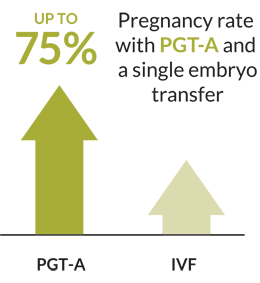Advances in fertility treatment provide hope to couples struggling to have a child

If you are struggling to grow your family, you are not alone! Approximately 1 in 6 couples have trouble getting pregnant. “More and more people are talking about infertility, a previously taboo subject. Your friends, your family and even celebrities are all sharing their struggles.”
Like many couples, Lindsey and her husband Chris expected to get pregnant right away once they started trying to have a family. After a few months with no success, however, Lindsey was afraid something was wrong. At 39 she was worried about the clock ticking so she asked her family doctor to refer her to a fertility specialist. Fertility evaluation and testing are covered by MSP in British Columbia with a referral from a family physician or walk-in clinic.
“With all the breakthroughs in fertility treatment, we can help most women achieve a pregnancy. There are so many more tools in our toolkit for treating infertility. We are particularly excited about recent tests used in IVF that can indicate the chromosomal health of the embryo.” says Victoria fertility specialist Dr. Ginevra Mills.
After a thorough fertility workup, Lyndsey and Chris were diagnosed with unexplained infertility. This is a very frustrating diagnosis, but it does not mean that it can not be successfully treated. Often the treatment is In-vitro Fertilization (IVF). This is a procedure in which egg and sperm are combined outside the body to form embryos. The healthiest embryo(s) is transferred back into the woman’s uterus or womb where it develops into a baby.
As the couple found out, sometimes the journey can be a rollercoaster. “After a successful egg retrieval, we ended up with 7 fertilized embryos. However, our doctor called to inform us that 6 of the 7 embryos had stopped growing completely and there was one left that could be biopsied for genetic testing and frozen.” Says Lyndsey.
Where a few years ago, fertility doctors would just have to transfer an embryo and hope for the best, advances in fertility treatment are now able to increase the success rate of IVF. An advancement in embryo testing called Preimplantation Genetic Testing for Aneuploidies or PGT-A has made it possible to identify chromosomally healthy embryos for transfer during an IVF procedure.
What Does PGT-A Involve?
With PGT-A, an egg is fertilized in the laboratory and the embryo is grown for 5 days at which point 5-10 cells are taken from the part of the embryo that will form the placenta (thus leaving the cells that are destined to become the fetus untouched). The embryo is then frozen, and the biopsied cells are sent to a specialized laboratory for testing. The results usually return in 10-14 days identifying which embryos are chromosomally normal. A healthy embryo can be transferred in the next menstrual cycle.
Studies have shown that IVF with PGT-A can achieve:
• Pregnancy rates as high as 75%
• Miscarriage rate as low as 10%.
• A very low risk of chromosomal problems such as Down's syndrome (diagnostic accuracy of PGT-A is about 99%).
In Lyndsey and Chris’ case, the PGT-A test found the single embryo to be chromosomally normal. “We did our embryo transfer in May, 2022. It was quite stressful to have to travel over to Vancouver for the procedure. To say that I was terrified that this wouldn’t work is an understatement. For about 2 weeks I essentially held my breath as we waited to find out if we were pregnant. Well, I am happy to say that we now have a beautiful, happy, healthy baby girl.”
“We are constantly searching for ways to improve pregnancy success rates while maintaining the health of the mother and baby,” says Dr. Mills. “At Olive, we are immensely proud of our lab and our science and are totally committed to using any evidence-based technique that will increase the chances of a pregnancy and healthy baby. We are very excited that Olive will have a world-class state-of-the art IVF clinic in Victoria in early 2023 so that Island patients like Lyndsey and Chris will be able to have all their fertility treatments close to home.”






